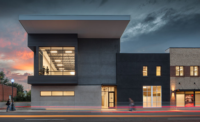The design-build team for Denver’s Central Platte Campus project, led by Lakewood’s Pinkard Construction Co. and architecture firm RNL, Denver, recently received a Design-Build Excellence Award from the Design-Build Institute of America.

The $28-million, 105,000-sq-ft campus service center provides state-of-the-art facilities for the City of Denver’s fleet maintenance, solid waste management, street maintenance, traffic engineering and right-of-way enforcement services. The project also includes an office/warehouse, vehicle maintenance building, covered and heated vehicle storage, fuel and wash facilities, and salt and magnesium chloride storage.
The highly visible 18-acre campus is located at a busy intersection along I-25. The design-build team made sure the project contributed to the urban context with an innovative design aesthetic, sustainability and functionality. The result is a LEED-Gold project featuring an optimized roof design for photovoltaics, daylight/occupancy sensors, a radiant floor heating system, evaporative cooling, the reclamation and reuse of 80% of vehicle wash rinse cycle water, low flow/water efficient fixtures and native non-irrigated landscaping.
Mechanical and electrical systems are designed to reduce energy consumption, while low-VOC interior finishes combine with daylight and views to create an appealing work environment.
RNL project manager Tom Wiener said a lot of thought went into creating an appropriate frontage of the site to I-25 and the South Platte River. “The solution was to separate the site functions and place the buildings in a north-south axis to allow for optimal solar orientation as well as provide interesting views of the campus from I-25,” he said. This also created more efficient vehicle circulation patterns and allows room for future expansion.
Contaminated soil on the site created the most significant project challenge. Various hazardous materials, including asbestos, lead and arsenic, had to be removed and the remaining area (nearly the entire site) was encapsulated with a layer of clay to prevent storm water from filtering through the acid-generating soil and into the water table. This operation had to be completed before the property could be transferred to the City. The duration of the cleanup dictated the schedule for closing on the property and ultimately allowed for only three months of construction to build the first phase and also presented design challenges.
The project, owned by City and County of Denver’s Public Works Department, was honored for effective design-build teaming that exceeded the owner’s needs. A jury of design-build experts met at DBIA’s Washington, D.C., headquarters in June to review the submissions and the award was presented during the National Design-Build Conference and Expo in Orlando, Fla., earlier this fall.
Although the awards program received over 100 submissions in 11 categories only 21 projects were honored by DBIA with an award.



